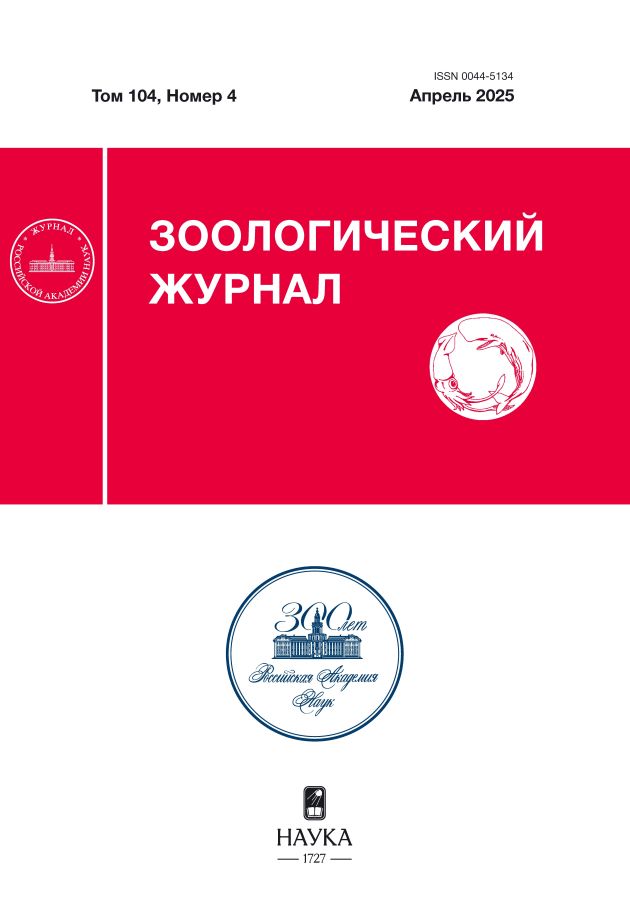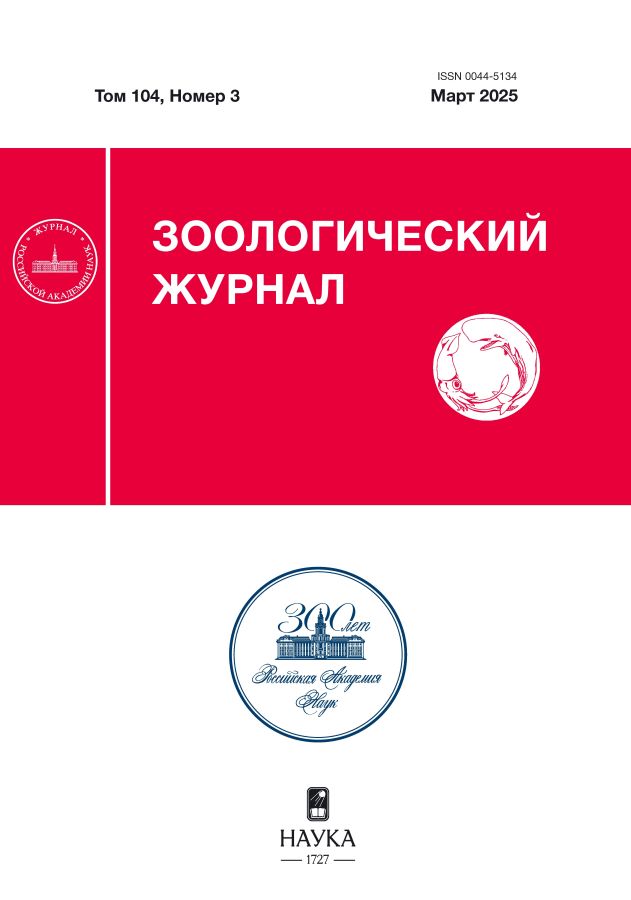The structure of correlations of phenotypic characters in the individual and historical development of barbs of the Barbus (=Labeobarbus) intermedius complex in Lake Tana, Ethiopia
- Authors: Mironovsky А.N.1, Kozhara A.V.2,3, Slynko E.E.4,5
-
Affiliations:
- Severtsov Institute of Ecology and Evolution, Russian Academy of Sciences
- Papanin Institute for Biology of Inland Waters, Russian Academy of Sciences
- AquaBioSafe Laboratory, University of Tyumen
- Russian Biotechnological University
- Kovalevsky Institute of Biology of the Southern Seas, Russian Academy of Sciences
- Issue: Vol 104, No 3 (2025)
- Pages: 10-19
- Section: ARTICLES
- URL: https://permmedjournal.ru/0044-5134/article/view/679397
- DOI: https://doi.org/10.31857/S0044513425030026
- EDN: https://elibrary.ru/abooas
- ID: 679397
Cite item
Abstract
The structure of correlation systems of craniological measurements in the generalized form of barbs of the Barbus (=Labeobarbus) intermedius complex from Lake Tana (headwaters of the Blue Nile River) at different body lengths (SL) is considered. In the group of small-sized individuals (SL < 15 cm), the characters related to the same section of the skull (neurocranium or splanchnocranium) are most closely correlated with each other. In large-sized fish (SL > 15 cm), the magnitude of correlations between the characters does not correspond strictly to their attribution to one of the skull sections, and some of the splanchnocranium characters are clustered together with those of the neurocranium. Restructuring of the correlation system in the ontogeny of the fish investigated is mainly associated with the trophic specialization of the Lake Tana barbs underlying the adaptive radiation of this group. The assumption is substantiated that the ontogeny of recent representatives of the Lake Tana barbs to a certain extent recapitulates their phylogeny.
Full Text
About the authors
А. N. Mironovsky
Severtsov Institute of Ecology and Evolution, Russian Academy of Sciences
Author for correspondence.
Email: adissa@mail.ru
Russian Federation, Moscow, 119072
A. V. Kozhara
Papanin Institute for Biology of Inland Waters, Russian Academy of Sciences; AquaBioSafe Laboratory, University of Tyumen
Email: akozhara@mail.ru
Russian Federation, Borok, Nekouzskii raion, Yaroslavl oblast, 152742; Tyumen, 625003
E. E. Slynko
Russian Biotechnological University; Kovalevsky Institute of Biology of the Southern Seas, Russian Academy of Sciences
Email: elena.slynko.76@mail.ru
Russian Federation, Moscow, 125080; Sevastopol, 299011
References
- Берг Р. Л., 1993. Генетика и эволюция. Избранные труды. Новосибирск: Наука. 283 с.
- Васильев А. Г., Васильева И. А., Шкурихин А. О., 2018. Геометрическая морфометрия: от теории к практике. М.: Товарищество научных изданий КМК. 471 с.
- Голубцов А. С., 2010. “Пучки видов” рыб в реках и озерах: симпатрическая дивергенция в фаунистических объединенных рыбных сообществах как особый модус эволюции // Актуальные проблемы современной ихтиологии. К 100-летию Г. В. Никольского. М.: Товарищество научных изданий КМК. С. 96–123.
- Дгебуадзе Ю. Ю., Мироновский А. Н., Мэндсайхан Б. и др., 2020. Быстрая морфологическая диверсификация карповой рыбы Oreoleuciscus potanini (Cyprinidae) при образовании водохранилища на реке семиаридной зоны // Доклады Российской Академии наук. Науки о жизни. Т. 490. № 1. С. 85–89. https://doi.org/10.31857/S2686738920010060
- Животовский Л. А., 1991. Популяционная биометрия. Москва: Наука. 270 с.
- Ивантер Э. В., Коросов А. В., 2011. Введение в количественную биологию. Петрозаводск: Изд-во ПетрГУ. 302 с.
- Камшилов М. М., 1941. Корреляции и отбор // Журнал общей биологии. Т. 2. № 1. С. 109–128.
- Левин Б. А., 2003. Структура локальных популяционных систем у рыб рода Barbus // Матер. ІІ міжнар. наук. конф. “Біорізноманіття та роль зооценозу в природних і антропогенних екосистемах”. Днепропетровск: Изд-во ДНУ. С. 53–55.
- Мина М. В., Мироновский А. Н., 2022. Сравнительный анализ структуры различий между некоторыми морфотипами крупных африканских усачей рода Barbus (Labeobarbus auctorum) из озера Тана, Эфиопия // Вопросы ихтиологии. Т. 62. № 3. С. 272. https://doi.org/10.31857/S0042875222030134
- Мина М. В., Мироновский А. Н., Дгебуадзе Ю. Ю., 2016. Полиморфизм по пропорциям черепа у крупных африканских усачей Barbus intermedius sensu Banister, 1973 (Cyprinidae) из озер Аваса и Лангано (Рифтовая долина, Эфиопия) // Вопросы ихтиологии. Т. 56. № 4. С. 403–409. https://doi.org/10.7868/S0042875216040081
- Мина М. В., Мироновский А. Н., Капитанова Д. В., 2011. Фенетические отношения и вероятные пути морфологической диверсификации африканских усачей комплекса Barbus intermedius из озера Тана (Эфиопия) // Вопросы ихтиологии. Т. 51. № 2. С. 149–163.
- Мироновский А. Н., 2006. Факторы, обуславливающие сопоставимость данных, полученных путем оценки пластических признаков рыб // Вопросы ихтиологии. Т. 46. № 2. С. 240–251.
- Мироновский А. Н., 2017. Место генерализованной формы в структуре фенетического разнообразия крупных африканских усачей комплекса Barbus intermedius. Метод корреляционных плеяд // Вопросы ихтиологии. Т. 57. № 4. С. 393–404.
- Мироновский А. Н., 2020. Крупные африканские усачи: векторы диверсификации особей генерализованной формы как основа морфологического разнообразия комплекса Barbus intermedius в озере Тана, Эфиопия // Вопросы ихтиологии. Т. 60. № 3. С. 283–294.
- Поздняков А. А., 2019. Эпигенетическая теория эволюции: предшествующие идеи, проблемы и перспективы // Русский орнитологический журнал. Т. 28. Экспресс-выпуск № 1791. С. 3021–3059.
- Ростова Н. С., 2002. Корреляции: структура и изменчивость // Труды С.- Петербургского общества естествоиспытателей. Серия 1. Т. 94. 306 с.
- Северцов А. Н., 1914. Современные задачи эволюционной теории. М.: Наука. 155 с.
- Терентьев П. В., 1959. Метод корреляционных плеяд // Вестн. Ленингр. Ун-та. № 9. С. 137–141.
- Терентьев П. В., 1960. Дальнейшее развитие метода корреляционных плеяд // Применение математических методов в биологии. Л.: Изд-во ЛГУ. Вып. 1. С. 27– 36.
- Шишкин М. А., 1987. Индивидуальное развитие и эволюционная теория // Эволюция и биоценотические кризисы. М.: Наука. С. 76–124.
- Шмальгаузен И. И., 1938. Организм как целое в индивидуальном и историческом развитии. М.: Изд-во АН СССР. 144 с.
- Шмальгаузен И. И., 1982. Избранные труды. М.: Наука. 383 с.
- Banister K. E., 1973. A revision of the large Barbus (Pisces, Cyprinidae) of East and Central Africa. Pt. II // Published in Bulletin of the British Museum (Natural History) (Zoology Series). V. 26. P. 1–148.
- Goswami A., Polly P. D., 2010. The influence of modularity on cranial morphological disparity in Carnivora and Primates (Mammalia) // PLoS ONE. V. 5. № 3. P. 1–8. https://doi.org/10.1371/journal.pone.0009517
- Mina M. V., Mironovsky A. N., Dgebuadze Yu.Yu., 1996. Lake Tana large barbs: phenetics, growth and diversification // Journal of Fish Biology. V. 48. P. 383–404.
- Mina M. V., Mironovsky A. N., Dgebuadze Yu.Yu., 1996a. Morphometry of barbel of Lake Tana, Ethiopia: multivariate ontogenetic channels // Folia Zool. 45. Suppl. 1. P. 109–116.
- Mina M. V., Mironovsky A. N., Golani D., 2001. Consequences and modes of morphological diversification of East African and Eurasian barbins (genera Barbus, Varicorhinus and Capoeta) with particular reference to Barbus intermedius complex // Environ. Biol. Fish. V. 61. P. 241–252.
- https://doi.org/10.1023/A:1010952108081
- Murren C. J., Pendleton N., Pigliucci M., 2002. Evolution of phenotypic integration in Brassica (Brassicaceae) // American Journal of Botany. V. 89. № 4. Р. 655– 663.
- Nagelkerke L. A.J., Sibbing F. A., 2000. The large barbs (Barbus spp., Cyprinidae, Teleostei) of Lake Tana (Ethiopia), with a description of a new species, Barbus osseensis // Netherlands Journal of Zoology. V. 50. № 2. P. 179–214. https://doi.org/10.1163/156854200505946
- Nagelkerke L. A.J., Sibbing F. A., van den Boogaart J. G.M. et al., 1994. The barbs (Barbus spp.) of Lake Tana: a forgotten species flock? // Environ. Biol. Fish. V. 39. P. 1–21.
- Olson E. C., Miller R. L., 1958. Morphological Integration. Chicago: University of Chicago Press. 317 p.
- Waddington C. H., 1957. The strategy of the genes: a discussion of some aspects of theoretical biology. L.: Allen and Unwin. 262 p.
Supplementary files















